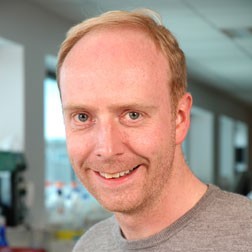
Decompaction of transcription environments by microphase separated RNA hydrogels
This event has now finished.
Event details
Abstract
The nucleoplasm’s main function is to store chromosomes and support DNA-dependent processes, like transcription. It consists of protein and RNA, but how these components interact, and influence chromatin organisation is unknown. Different models have proposed either a fluid-like free polymer nature for chromatin or its self-organization into solid-like structures. To address this apparent discrepancy, we used super-resolution microscopy and computer simulations to understand how the nuclear environment influences chromatin architecture. We reveal a novel mechanism where newly synthesized RNA interacts with SAF-A (scaffold attachment factor A, or HNRNPU), to form interconnected microgels that are degraded by the exonuclease XRN2, leading to a dynamic cycle of gelation and fluidization. The RNA polymer gel significantly impacts protein mobility, and regulates chromatin compaction by modulating bridging-induced micro-phase separation, to partition transcriptionally active chromatin regions into an open configuration. Our results demonstrate that the material characteristics of cellular chromatin are intricately linked to the nuclear microenvironment. Furthermore, congenital mutations in SAF-A cause a neurodevelopmental disorder with associated developmental delay and epilepsy, whilst the protein is frequently mutated in cancer. I’ll discuss our latest results investigating how a fundamental protein like SAF-A can regulate chromatin structure and be involved in disease.

About the speaker
Professor Nick Gilbert
Nick is a group leader at the MRC Human Genetics unit and is Director of Graduate Research for the Institute of Genetics and Cancer. He started his career as a PhD student in the biochemistry department at Edinburgh University, and continued his training as a postdoc with Professor Wendy Bickmore. He started his lab in the Edinburgh Cancer Research Centre in 2006 with a fellowship from the Wellcome Trust and moved to the Human Genetics Unit in 2012 funded by an MRC Senior Fellowship. Nick is currently an MRC Investigator and holds a Wellcome Investigator award.
Nick’s lab studies how DNA is folded up with proteins to form chromatin inside mammalian cells. Although this has been studied this for many years it is a big problem, mainly because chromatin is a massive macromolecular complex that makes it very difficult to study. Chromatin is central to understanding many nuclear processes and recent next generation sequencing projects have identified many mutations in chromatin proteins in cancer. Surprisingly his group has found that an abundant nuclear protein, SAF-A, that is often mutated in neurodevelopmental disorders is a regulator of chromatin folding and packaging in the nucleus.
Venue details
Wheelchair accessible
Hearing loop
